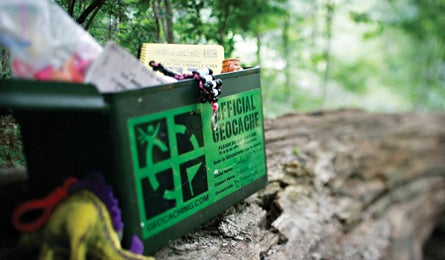Does Geocaching Violate Leave No Trace?

'A typical stash uncovered near Pittsburgh, Steve Gengler'
For most hikers, “pack it in, pack it out” is instinctive. But for geocachers–treasure hunters guided by Internet directions and GPS coordinates–leaving behind boxes containing pins and patches for others to find and swap is part of the fun. Strong sales of handheld GPS units have fueled the sport’s popularity, boosting the number of caches worldwide from 75 in 2000 to more than 475,000 today. As a result of the rapid growth, land managers from Colorado’s San Juan National Forest to North Carolina’s state parks are restricting geocaching on public lands, generating a backlash from this passionate hiking subculture. But the question remains: Are these hidden containers harmless, or do they flout low-impact ethics?
Yes
Whether you consider a geocache box as litter or a semi-permanent stash, the practice is against national park and forest regulations, even if some land managers choose to bend the rules. “Cache In, Trash Out” is merely a public-relations campaign to overlook the sport’s clear-cut violation of many LNT principles. Even if every geocacher removed a ton of trash from wilderness areas, it doesn’t erase the fact that they deliberately left a box filled with toys behind. No individual has the right to lay special claim to any portion of our public land. Hiking should be a personal exploration, and any reward, if there is one, should be chanced upon and not tracked down by technology.
Scott Silver, Executive Director Wild Wilderness
No
The geocaching community strongly promotes “Cache In, Trash Out.” We try to leave an area in better shape than we found it, which can’t be said of all hikers. A well-maintained and hidden cache is not trash, but rather a place that has frequent visitors and is maintained by a specific person in the region. Geocaching is a great activity for all ages that attracts people to parks and forests who wouldn’t otherwise visit them. We would love to see all public land open to geocaching, but we recognize that sensitive areas need more protection. As a result, we work with local managers to set limits on cache locations. After all, we want to encourage the growth of this sport while also preserving where we play.
Allen Waterman President, Iowa Geocachers Organization
YOUR VIEW
Yes 42%
No 58%
Results of a Backpacker.com poll